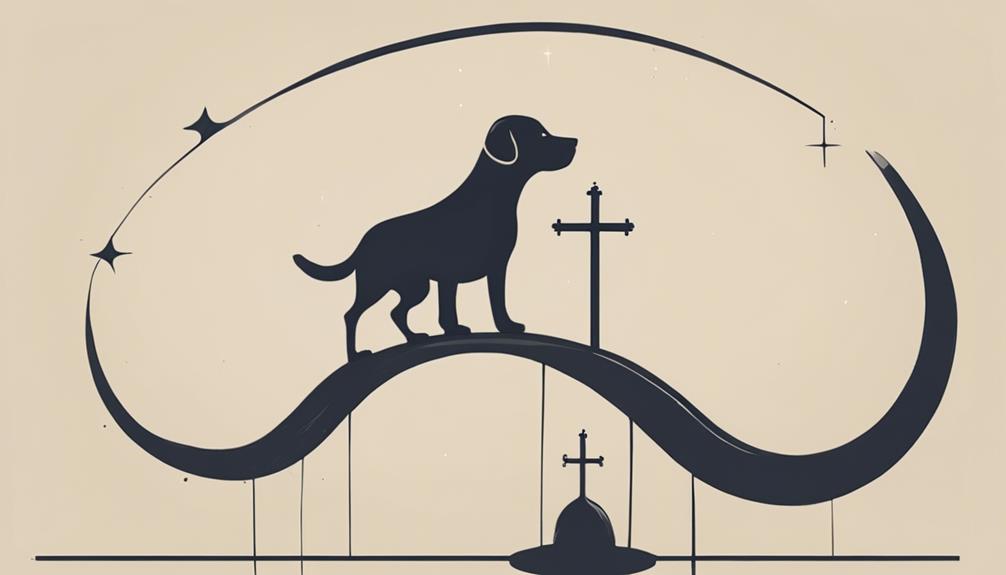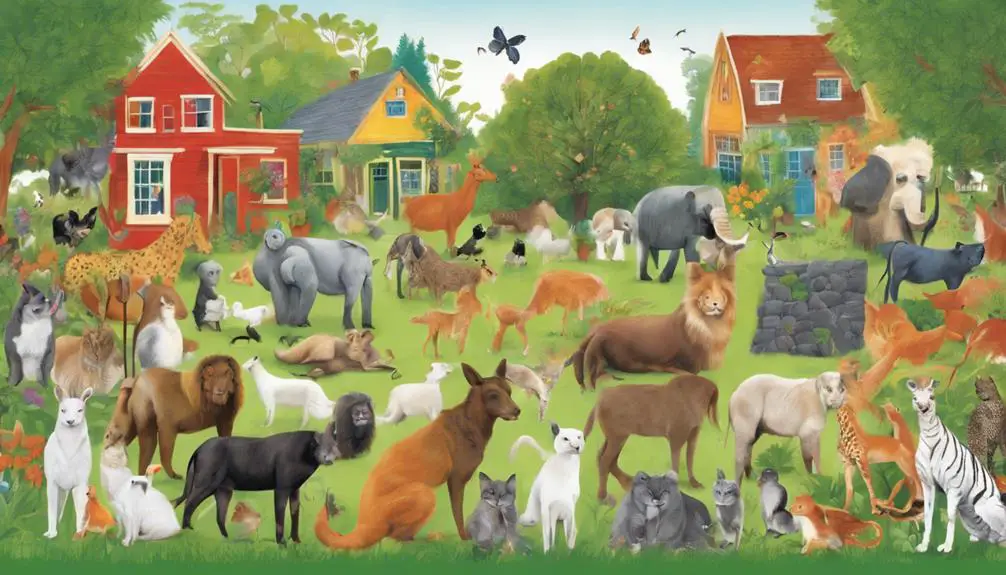This exploration of whether pet ownership crosses ethical or spiritual lines invites a deep dive into cultural, religious, and modern perspectives.

Is Owning a Pet a Sin?
As the saying goes, 'A dog is a man's best friend,' but have you ever wondered if owning that furry friend, or any pet for that matter, crosses ethical or even spiritual boundaries? Throughout history, various cultures and religions have offered differing views on the morality of pet ownership, juxtaposing the nurturing of animals against potential concerns of selfishness or exploitation.
The modern debate extends into the realms of animal rights, personal responsibility, and the environmental impacts of pet care. You're standing at the crossroads of tradition and contemporary ethics, facing a question that might reshape your understanding of companionship. Let's explore this complex issue together, considering historical religious perspectives, modern ethical considerations, the impact on animals, cultural viewpoints, and the essence of personal responsibility in pet care.
Key Takeaways
- Pet ownership is viewed differently across religions, with no unanimous stance on it being a sin.
- Ethical pet ownership emphasizes empathy and welfare, aligning with many religious values of compassion.
- Legal and religious contexts greatly influence attitudes towards pets, underscoring the complexity of labeling it as a sin.
- Responsibility and care in pet ownership can foster positive emotional and spiritual connections, challenging the notion of sinfulness.
Historical Religious Views

How have various religions historically perceived the ownership of pets, and what implications does this hold for modern believers? The relationship between humans and animals, within the context of religious practices, has been complex and multifaceted.
Historical documentation reveals that animal sacrifices were commonplace in many ancient religions, serving as a conduit for communication with the divine. This practice underscored the belief in the instrumental value of animals, positioned as offerings to appease or thank the gods.
Concurrently, certain faiths have elevated animals to a sacred status, embedding them within their religious narratives and rituals as sacred animals. These creatures weren't merely pets but were seen as embodiments of spiritual entities or as possessing divine attributes.
This dichotomy between animals as sacrificial elements and as sacred beings illustrates the nuanced positions on animal ownership and their role within religious contexts. For modern believers, these historical perspectives can inform contemporary attitudes toward pets. The reverence for sacred animals may translate into a heightened sense of responsibility and care for pets, aligning with religious teachings on compassion and stewardship.
Meanwhile, the legacy of animal sacrifices, though largely obsolete, might still influence views on the moral and spiritual implications of animal ownership.
Modern Ethical Considerations
In today's society, ethical considerations surrounding pet ownership delve into the moral responsibilities humans have towards animals, reflecting a shift towards more empathetic and welfare-oriented perspectives. This evolution in thought aligns closely with the principles of animal rights and ethical consumerism, challenging individuals to reconsider their interactions with animals, not merely as owners but as guardians.
You're now navigating a landscape where ethical consumerism plays a pivotal role in decisions related to pet ownership. It's no longer just about providing food, water, and shelter; it's about ensuring that your actions don't inadvertently support industries that exploit animals. This means scrutinizing where and how pets are acquired, advocating for adoption over purchase, and opposing practices that harm animals for profit.
Moreover, the emphasis on animal rights demands a reevaluation of the intrinsic value of animals, promoting their well-being and freedom. This perspective encourages you to see pets not as property but as sentient beings with their own needs and rights. As a result, you're urged to commit to responsible pet ownership, which includes understanding and respecting the natural behaviors and emotional states of animals, thereby fostering a more ethical and compassionate relationship between humans and their pets.
The Impact on Animals

Considering the evolved ethical landscape, it's crucial to examine the direct effects that pet ownership has on animals themselves. The examination of animal rights and the environmental implications of keeping pets reveals a series of contradictory realities. On one hand, pets receive care and affection, but on the other hand, the very act of owning pets can sometimes compromise their freedom and natural behaviors.
Impact on Animals |
Description |
|---|---|
Physical Well-being |
Pets often receive regular veterinary care, improving their health. However, confined spaces can limit their physical activity. |
Psychological Health |
Interaction with humans can enrich their lives, yet it may also induce stress, especially in exotic pets not adapted to domestic life. |
Natural Behaviors |
Domestic environments can restrict the expression of instinctual behaviors, leading to potential frustration and behavioral issues. |
Population Control |
Neutering and spaying help manage pet populations but raise ethical concerns regarding animal rights and autonomy. |
| Environmental Implications | Pets, particularly carnivorous ones, contribute to environmental strain through resource consumption and waste production, challenging sustainable living ideals.
Understanding these aspects is essential in fostering a more ethically conscious relationship with pets, ensuring their well-being while considering broader environmental implications.
Cultural Perspectives
Across various cultures, attitudes toward pet ownership vary significantly, reflecting deeply ingrained beliefs and traditions that influence how animals are perceived and treated within society. The role of pets ranges from being considered sacred and integral to societal norms to being largely utilitarian. Understanding this spectrum is essential in grasping the complexities surrounding the ethicality of owning pets.
- Animal Symbolism: In some cultures, certain animals are revered, embodying spiritual significance or serving as totems. This symbolism can dictate the types of animals that are favored as pets or even forbidden to own.
- Societal Norms: Norms and values shape the treatment of pets, from the care provided to the status pets hold within the family unit. These norms are reflective of broader societal attitudes towards empathy, stewardship, and coexistence with nature.
- Cultural Heritage: Historical relationships between humans and animals can influence contemporary pet ownership practices, with some societies having centuries-old traditions of animal domestication and companionship.
- Legal and Religious Influences: Legal frameworks and religious teachings can profoundly impact attitudes toward pet ownership, explicitly outlining what's considered acceptable interaction with animals.
These elements collectively inform the multifaceted cultural perspectives on pet ownership, underscoring the importance of context in discussions about the morality of owning pets.
Personal Responsibility and Care

Owning a pet demands a significant level of personal responsibility and commitment to ensure their well-being and happiness. This responsibility encompasses both the financial implications and the emotional benefits tied to pet ownership. From a financial perspective, you're tasked with providing for your pet's basic needs, such as food, healthcare, and shelter. These costs can accumulate, making it imperative to assess your financial readiness before taking on such a commitment.
On the emotional front, the benefits are substantial, yet they also demand your active engagement and emotional investment. Pets offer unparalleled companionship, reducing feelings of loneliness and fostering a sense of purpose. However, this relationship requires you to be attuned to your pet's emotional and physical needs, demonstrating empathy and understanding.
Moreover, the responsibility extends beyond the individual to the broader community. You must ensure your pet's behavior doesn't negatively impact others, highlighting the importance of proper training and socialization.
Frequently Asked Questions
How Do Different Religions Reconcile the Practice of Pet Ownership With Their Environmental Stewardship Beliefs?
Different religions balance pet ownership and environmental stewardship by integrating religious rituals and viewing animals as sacred, reflecting a harmonious relationship with nature that respects and upholds both spiritual practices and ecological responsibility.
In What Ways Do Pet Ownership Laws Vary Across Countries, and How Do They Reflect the Society's View on Animal Rights?
Pet ownership laws differ globally, reflecting cultural norms through legal frameworks. You'll find societies' views on animal rights mirrored in these regulations, offering insights into how each country prioritizes and manages animal welfare.
Can Owning a Pet Contribute to an Individual's Mental and Physical Health, According to Recent Scientific Studies?
Yes, owning a pet can boost your mental and physical health. Studies show pets help reduce stress and encourage exercise routines, though you've got to consider pet allergies when choosing the right animal for you.
How Does the Trend of Pet Ownership Impact the Economy, Especially in Terms of the Pet Care Industry's Growth?
The trend of pet ownership significantly boosts the economy, notably through pet insurance growth and consumer spending trends. It's driving expansion in the pet care industry, reflecting a broader economic impact beyond mere personal enjoyment.
What Are the Philosophical Arguments Against or in Favor of Considering Pets as Personal Property Versus Sentient Beings With Rights?
You're exploring the philosophical debate on pets as property or sentient beings. This involves legal frameworks and moral ambiguity, analyzing how society's views and laws reflect or conflict with recognizing animals' rights and welfare.
Conclusion
In conclusion, evaluating whether owning a pet is a sin necessitates a multifaceted analysis. Historical religious views vary widely, as do modern ethical considerations.
The impact on animals, influenced by cultural perspectives, can't be overlooked. Ultimately, personal responsibility and care emerge as pivotal factors. It's clear that the morality of pet ownership hinges on the intent and actions of the owner, rather than a blanket moral judgment.
Analyzing this issue requires a nuanced, informed approach, acknowledging diverse viewpoints and ethical dimensions.



Sign up